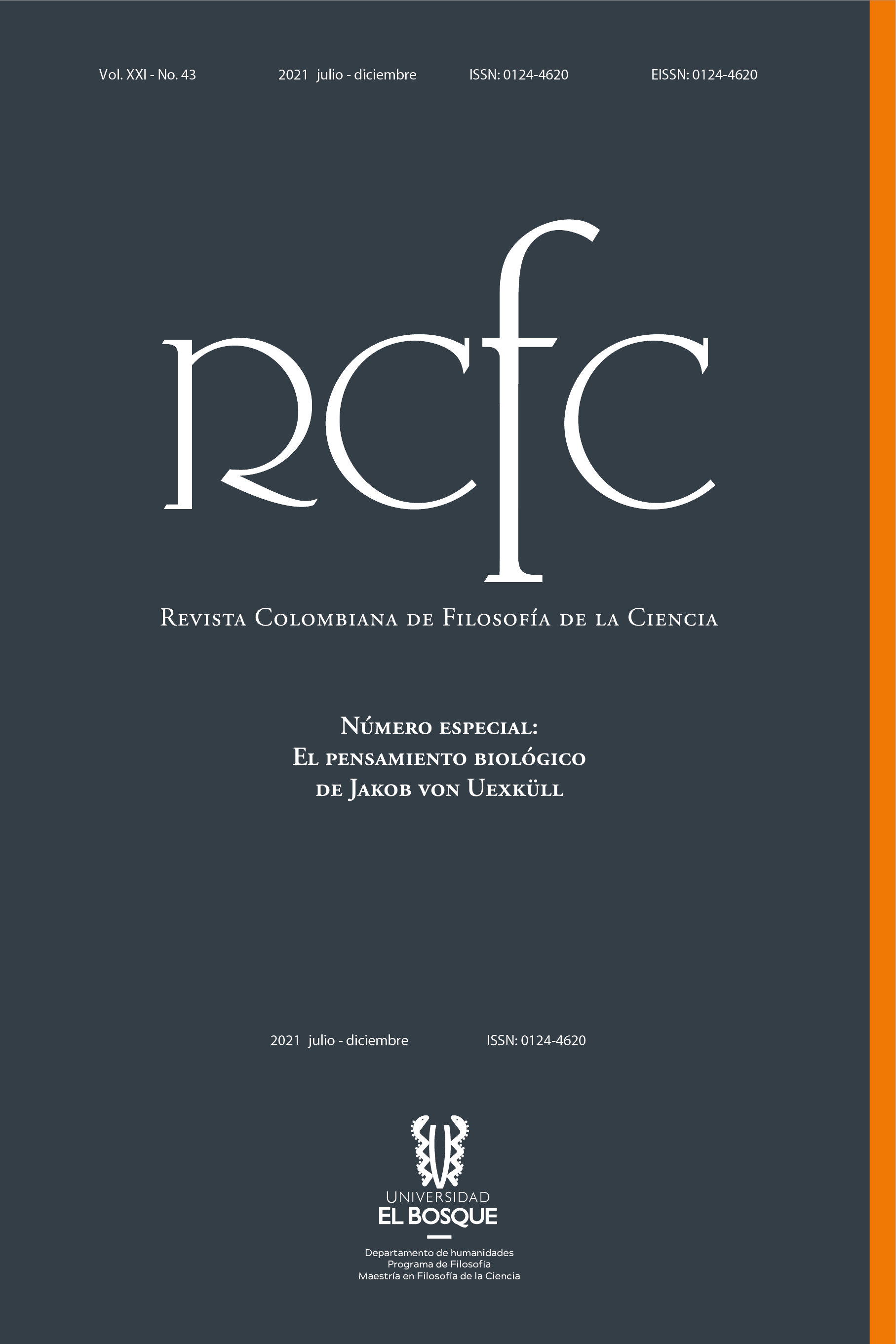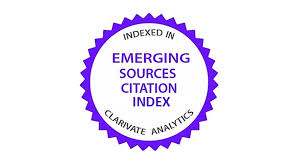Pensar la Filosofía de la Biología de Comienzos de siglo XX a Través de Jakob von Uexküll
DOI:
https://doi.org/10.18270/rcfc.v43i21.3790Palabras clave:
Jakob von Uexküll, filosofía de la biología, vitalismo, mecanicismo, organicismoResumen
El desarrollo de la filosofía de la biología en la primera mitad del siglo xx ha sido objeto de múltiples estudios que buscan comprender la importancia que tuvo en el desarrollo de las ciencias de vida, la cual había sido minimizada hasta hace pocas décadas. El objetivo de este trabajo es mostrar a Jakob von Uexküll como un autor clave para entender los desplazamientos conceptuales y epistemológicos que se dieron en esta época; analizando su relación con el vitalismo, el mecanicismo y el surgimiento de una biología estructural como respuesta a estos conflictos epistemológicos.
Descargas
Referencias bibliográficas
Bertalanffy, Ludwig von. Modern Theories of Development. London: Oxford University Press, 1933.
Blanco Martín, Carlos. “Biologia Kantiana y Enfoque Biosemiótico”. A Parte Rei: Revista de Filosofía 45.1 (2006): 1–13.
Brentari, Carlo. Jakob von Uexküll: The Discovery of the Umwelt between Biosemiotics and Theoretical Biology. Dordrecht: Springer, 2015.
Canguilhem, Georges. Knowledge of Life. Eds. Paola Marrati y Todd Meyers. New York: Fordham University Press, 2008 (año de publicación del libro original; 1965).
Cassirer, Ernst. Las ciencias de la cultura. México, D. F.: Fondo de Cultura Económica, 2005 (año de publicación del libro original; 1942).
Cheung, Tobias. “Cobweb Stories: Jakob von Uexküll and the Stone of Werder”. Place and Location: Studies in Environmental Aesthetics and Semiotics 5 (2006): 231–253.
Chien, Jui-Pi.“Schema as Both the Key to and the Puzzle of Life: Refletions on the Uexküllian Cruz”. Sign Systems Studies 32.2 (2004): 187–208.
Dyck, Hans Van. “Changing Organisms in Rapidly Changing Anthropogenic Landscapes: The Significance of the ’Umwelt’-Concept and Functional Habitat for Animal Conservation”. Evolutionary Applications 5.2 (2012): 144–53. <https://doi.org/10.1111/j.1752-4571.2011.00230.x>
Esposito, Mauricio. “Kantian Ticks, Uexküllian Melodies, and the Transformation of Transcendental Philosophy”. Jakob von Uexkull and Philosophy. Eds. F. Michelini y K. Köchy. Londres: Routledge, 2020. 35-51.
Hahn, Hans., Otto, Neurath., y Rudolf, Carnap. “La Concepción Científica Del Mundo: El Círculo de Viena”. Redes. Revista de Estudios Sobre La Ciencia y La Tecnología 9.18 (2002): 103–50.
Hanson, Norwood Russell. Patterns of Discovery. Cambridge: Cambrigde University Press, 1958.
Harrington, Anne. Reenchanted Science. Holism in German Culture from Wilhelm II to Hitler. New Jersey: Princeton University Press, 1996.
Heredia, Juan Manuel. “Prólogo: Jacob von Uexküll, Portavoz de Mundos Desconocidos”. Cartas Biológicas a Una Dama. Buenos Aires: Cáctus, 2014. 7-33.
______. “Jakob von Uexküll, an Intellectual History”. Jakob von Uexküll and Philosophy. Life, Environments, Anthropology. Eds. F. Michelini y K. Köchy. London: Routledge, 2020. 17-35
Hofer, Veronika. “Philosophy of Biology in Early Logical Empiricism”. New Challenges to Philosophy of Science. Eds. H. Andersen, D. Dieks, et. ál. London, 2013. 351-364.
Kull, Kalevi. “On Semiosis, Umwelt, and Semiosphere”. Semiotica 120.3/4 (1998): 299–310.
______. “Jakob von Uexküll and the Study of Primary Meaning-Making”. Jakob von Uexküll and Philosophy. Life, Environments, Anthropology. Eds. F. Michelini y K. Köchy. London: Routledge, 2020. 219-237
Lorenz, Konrad. The Foundations of Ethology. The American Journal of Psychology. Vol. 95. New York: Springer, 1981.
Neurath, Otto. “Wege Der Wissenschaftlichen Weltauffassung”. Erkenntnis 1 (1930-1931): 106–125. <https://www.jstor.org/stable/20011593>
Nicholson, Daniel J., y Richard Gawne. “Neither Logical Empiricism nor Vitalism, but Organicism: What the Philosophy of Biology Was”. History and Philosophy of the Life Sciences 37.4 (2015): 345–381. <https://doi.org/10.1007/s40656-015-0085-7>
Palti, Elías. “Filosofía Romántica y Ciencias Naturales: Límites Difusos y Problemas Terminológicos”. Prismas - Revista De Historia Intelectual 4 (2000): 231–344. <http://ridaa.unq.edu.ar/handle/20.500.11807/2634>
______. “El ‘Retorno Del Sujeto’: Subjetividad, Historia y Contingencia En El Pensamiento Moderno”. Prismas - Revista De Historia Intelectual 7.1 (2003): 27–49. <http://ridaa.unq.edu.ar/handle/20.500.11807/2383>
Ruse, Michael. Philosophy of Biology Today. Albany: State University of New York Press, 1988.
Rüting, Torsten. “History and Significance of Jakob von Uexküll and of His Institute in Hamburg”. Sign Systems Studies 32.1 (2004): 35–72. <https://doi.org/10.12697/SSS.2004.32.1-2.02>
Stadler, Friedrich. El Círculo de Viena. Empirismo Lógico, Ciencia, Cultura y Política. Vol. 53. México, D. F.: Fondo de Cultura Económica, 2010.
Uexküll, Jakob von. Umwelt Und Innenwelt Der Tiere. Berlin: Springer, 1909.
______. Theoretical Biology. Londres: K. Paul, Trench, Trubner & Co, 1926 (año de publicación del libro original; 1920).
______. Teoría de La Vida. Madrid: Summa, 1944 (año de publicación del libro original; 1930).
______. Ideas Para Una Concepción Biológica Del Mundo. Buenos Aires: Espasa - Calpe, 1945 (año de publicación del libro original; 1913).
______. Cartas Biológicas a Una Dama. Ciudad Autómana de Buenos Aires: Cactus, 2014 (año de publicación del libro original; 1920).
______. Andanzas Por Los Mundos Circundantes de Los Animales y Los Hombres. Buenos Aires: Cáctus, 2016 (año de publicación del libro original; 1934).
Vecchi, Davide., y Isaac Hernández. “Epigénesis y Preformacionismo: Radiografía de Una Antinomía Inconclusa”. Scientiae Studia 13.3 (2015): 577–597. <https://doi.org/10.1590/S1678-31662015000300005>
Wolters, Gereon. “Wrongful Life: Logico-Empiricist Philosophy of Biology”. Experience, Reality, and Scientific Explanation: Essays in Honor of Merrilee and Wesley Salmon. Eds. M. C. Galavotti y A. Pagnini. Dordrecht: Kluwer Academic Publishers, 1999. 187-208
Descargas
Publicado
Cómo citar
Número
Sección
Licencia

Esta obra está bajo una licencia internacional Creative Commons Atribución-NoComercial-SinDerivadas 4.0.

| Estadísticas de artículo | |
|---|---|
| Vistas de resúmenes | |
| Vistas de PDF | |
| Descargas de PDF | |
| Vistas de HTML | |
| Otras vistas | |











